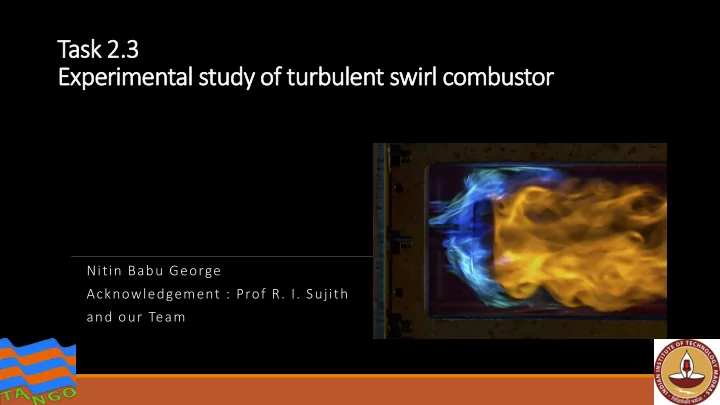

Task 2.3 Experimental study of turbulent swirl combustor Nitin Babu George Acknowledgement : Prof R. I. Sujith and our Team
Recap - Task 2.3 Experimental study of turbulent swirl combustor Ack: Polifke & Komarek (TUM) Simultaneous PIV and Chemiluminescence data Spatio-Temporal Analysis Lack of Hysteresis in swirl stabilized flames Relook at Hopf Bifurcations
Spatio-Temporal complexity Strogatz
Critical transitions happen if a system shifts from one attractor to another Scheffer
Present Scenario Can we have a unified framework? Scheffer
Intermittency is present in many spatio-temporal systems Drepper et al (1994) Nair & Sujith (2014) Touboul et al (2011)
Chaos to Limit Cycle via Intermittency Nair and Sujith (2014) In dynamical systems, intermittency is the irregular alternation of phases of apparently periodic and chaotic dynamics (Pomeau – Manneville dynamics), or different forms of chaotic dynamics (crisis-induced intermittency). Edward Ott (2002) Mingzhou Ding. Alwyn Scott
Is the turbulent flow field responsible for intermittency in turbulent combustors? Intermittent behavior is commonly observed in fluid flows that are turbulent or near the transition to turbulence. Intermittency has been observed in aero-acoustic systems also.
Cold flow PIV on bluff body Instantaneous velocity flow field Air Flow Oil seeding Lazkin Nozzle Δ t = 100 μ s
What can we learn from the flame dynamics • Mie Scattering – Unburnt reactants • Chemiluminescence Imaging – Reaction zone
Combustion Noise Intermittency Swirl Instability Before Blowout
Combustion Noise Intermittency Bluff Instability
Next stage • Swirler Configuration • Hot Flow PIV – Aluminium oxide seeding Spatial Analysis – Flame Behavior and Velocity field Secondment at TUM – Discussion ongoing • March/April 2016 • Conjugate heat transfer problem at the flame holder – Possibility of capturing intermittency
Thank you
Recommend
More recommend